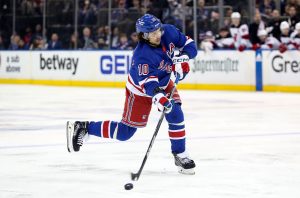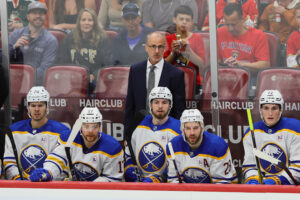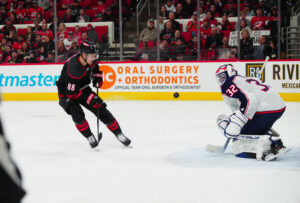We begin a series of articles today, reviewing the 2019-20 San Jose Sharks season. But, as some might argue, the season isn’t officially over. And while that is true, is anything going to meaningfully change if Sharks hockey returns for a pre-playoff cameo?
Now: Season Overview
Up next: The Forwards
There’s no getting around the basics, the 2019-20 San Jose Sharks season is an epic disappointment. A team expected by many to be in the playoffs and perhaps a legit Stanley Cup contender fell well short of that. The team sits with one of the league’s worst records. To fully describe just how bad it was, it helps to keep a thesaurus handy.
Even worse, the team’s collapse came in a season where they traded their top draft pick. The team will miss out on selecting in the highest draft spot the team has had in over 20 years, and perhaps the first overall pick. The lone benefit from a bad season is the potential to bring in an exceptional young talent via a very early draft pick. For the Sharks, that won’t happen.
2019-20 San Jose Sharks By The Numbers
The team’s record sits a 29-36-5, worst in the Western Conference and third worst in the entire league. The goal differential is minus-44, also third worst. The record is a fair reflection of the team’s play.
Among the team’s bigger issues is a lack of scoring and this shows up in their 182 goals, fifth fewest in the league. But they also allowed a lot, tied for the sixth most goals allowed.
The lone bright spot was the team’s penalty kill, rated best in the league with an 85.7% kill rate. The team also led the league in short-handed goal differential (minus-25), made even more impressive given the team played short-handed the third most minutes in the league.
Alas, the power play was a bust, essentially offsetting the penalty kill. The Sharks averaged 25% more time per game killing penalties than playing with the man advantage. They finished 24th in the league in power play goal differential (plus-27) and 23rd with a very modest 17.5% success rate.
The Sharks special teams essentially canceled each other, leaving the 5-on-5 play to determine the team’s fate; and the team was outscored 162-123.
The 2019-20 San Jose Sharks DeBoer Chronology
The team started poorly under head coach Peter DeBoer, losing their first four games (two to the Vegas Golden Knights, who seemed bent on revenge for what occurred in last season’s playoffs). The slow start resulted in the return to the Sharks of one Patrick Marleau and his two tallies resulted in the team’s first win of the season.
Still, the Sharks continued to totter for much of October. In November, they started to improve and played middle-tier hockey. Their record improved much more than their play, as the team was more lucky than good. Even during this brief surge, the team wasn’t outplaying opponents, just getting more than their share of timely bounces. Once that reversed, the Sharks record did, too.
In the first part of December, not only was the team back to losing, but most nights, they weren’t competitive. Out went DeBoer and most of his staff. The lone holdover was Bob Boughner, who was named interim head coach.
The 2019-20 San Jose Sharks Boughner Chronology
The Sharks improved under Boughner and were far more competitive, though the record didn’t reflect it as the Sharks lost several games in their late stages. As the season progressed, key players were injured, notably Tomas Hertl, Logan Couture (Couture did return shortly before the season stoppage) and Erik Karlsson.
With the team solidly out of playoff contention, the team sold at the trade deadline, parting with Brenden Dillon, Barclay Goodrow and the aforementioned Marleau. In return, the Sharks netted (most likely) a late first round pick, a late second round pick and a third round pick.
Without several starters gone (three injured, three traded), the Sharks did what they could, rolling out a lineup of younger players, many not quite ready for prime time. The season’s final weeks were a bit of an odd mix. To some extent, younger players received playing opportunity and a chance to build a case for a role with the Sharks next season. It made sense to go “all in” on the team’s next generation players and give the veterans less playing time. And yet, for some reason, veterans like Evander Kane and Brent Burns continued to command big minutes.
The 2019-20 San Jose Sharks Voids
Before the 2019-20 San Jose Sharks season began, we took a skeptical view of the team, noting three meaningful voids and stating, “this is a vulnerable team.” Each of the voids played a significant role. A lack of NHL-quality right-wingers coupled with an underwhelming prospect pool was one. The team’s lack of talented passers especially among the forwards was another. The third was durability and playing time, with some of the Sharks big minute players having less than stellar durability records.
The Sharks went the entire season with problems at right wing, and game after game, the chemistry between linemates, especially on the top lines, was absent. Passing the puck proved especially problematic; too many possessions died on a pass into the skates. But just as importantly, the subtle passes which create time and space for the recipient were also largely absent.
In seasons past, the Sharks relied on players like Joe Thornton, Joe Pavelski and Justin Braun to play 20 minutes a game, every game. But Pavelski and Braun departed, while Thornton’s minutes dropped. Players soaking up these minutes – Hertl, Erik Karlsson and Couture – all missed chunks off the season, with Karlsson and Hertl on long-term injured reserve at the time of the COVID-19 stoppage.
Karlsson, the team’s best player, began the season while still recovering from groin surgery. He’d finish it with recovering from hand surgery. In all, the Sharks got perhaps 30 healthy games from their top talent.
The Prior Sharks Season
The team had a brilliant roster the previous season, enabled by several underpaid players on expiring contracts. An underpaid roster can only last a short time in the salary cap era and it ended abruptly for the Sharks. In the offseason, Joe Pavelski, Gustav Nyquist and Joonas Donskoi, all right wingers, departed for greener pastures. Defenceman Braun was traded.
Two key players stayed put, Timo Meier and Erik Karlsson, each reeling in a $5 million raise. Even with all the departures, the Sharks found themselves up against the salary cap. One can look at the 2019-20 season in isolation, but it is fair to say the prior season had a major impact on this season.
The Vulnerable Sharks
The Sharks projected confidence at the start of the season, but it was always going to be a more difficult task for this season’s team. Karlsson wasn’t the lone Sharks defenceman to return at less than full health. Radim Simek had knee surgery in March and wasn’t able to start the season. He didn’t look like himself until around the time this season stopped. Meanwhile, the shortage of right wingers left the Sharks in search of youth who could fill roles. It isn’t that they needed to be good, but they did need to provide a good fit. A bit of chemistry would have gone a long way. Alas, that didn’t happen either.
The team’s goalies were both coming off poor prior seasons and that didn’t end when the new season began. The Sharks’ success has almost always been built on solid defense and respectable netminding. Neither showed up for the Sharks in the early parts of the season. Even with improvements (notably coming after Boughner took over), they remained hit and miss as the season went on.
The Sharks season was on life-support by the time Couture went out in early January, and for all intents and purposes, the season ended with a bad week in mid-January. The sort of bad week which hadn’t happened under Boughner with Couture’s on-ice presence.
Hertl’s injury in late January and Karlsson’s in mid-February didn’t change the team’s trajectory, but even if the team had stayed in the hunt longer, their roster had become non-competitive with the injuries.
In the end, the Sharks were less than the sum of their parts, not that they had quite the right parts to begin with.
The Hall-of-Fame Journeys
Two Sharks continued their Hall-of-Fame journeys, Marleau and Thornton. Both continued to reach meaningful milestones. Thornton moved into seventh place on the all-time assist list.
Marleau moved into fifth on the all-time games played list. He could, next season, take down Gordie Howe for the most NHL regular season games all-time (44 more games). He’s also capable of becoming the first player to play 2,000 total (regular season and playoff) games. He’ll need 86 games to reach that milestone. Marleau also sits 25th in goals scored with 562. Of course, Marleau’s current journey is with the Pittsburgh Penguins, though it seems likely he’ll return to San Jose next season.
The Revamped 2019-20 San Jose Sharks
The team used a lot of developing players, deploying nine players who made their NHL debut and a half dozen others who are still under 82 career games. A few showed they might have an NHL-worthy game, none looked ready to take on a major role.
In the final game before the COVID-19 stoppage, the Sharks deployed just 10 (of 18) skaters who were regular starters last March.
The 2019-20 San Jose Sharks Takeaways
There will be much finger-pointing with regards to this Sharks season and what went wrong. For those undertaking the task, it’s safe to say, bring extra fingers. I’ll be undertaking it after the season review pieces finish.
The 2019-20 season was about the worst possible for the Sharks. As a team expecting a playoff shot, it was a bust. As a team trying to develop youth, it yielded modest results. In a bad season, at least there’s usually a reward in the form of a high draft pick. That won’t happen for the Sharks. The culture of success disappeared, despite having four players who’ve worn the ‘C’ as a team captain. Star players in prior seasons had career worst seasons. Some key players expected to take a step did take a step, but in the wrong direction. Two solid players capable of being part of the Sharks longer-term future were traded for draft picks.
By late in the season, fan attendance diminished considerably. Bright spots, aside from the penalty kill, were few and far between. The mid-season play of goalie Aaron Dell and the late-season rebound of goalie Martin Jones were among them.
At the end of a season somewhere between disappointing and disastrous season, it’s worth asking, what was it all for? In the case of the 2019-20 San Jose Sharks, the answer isn’t obvious. Which is perhaps the most troubling answer there is.







